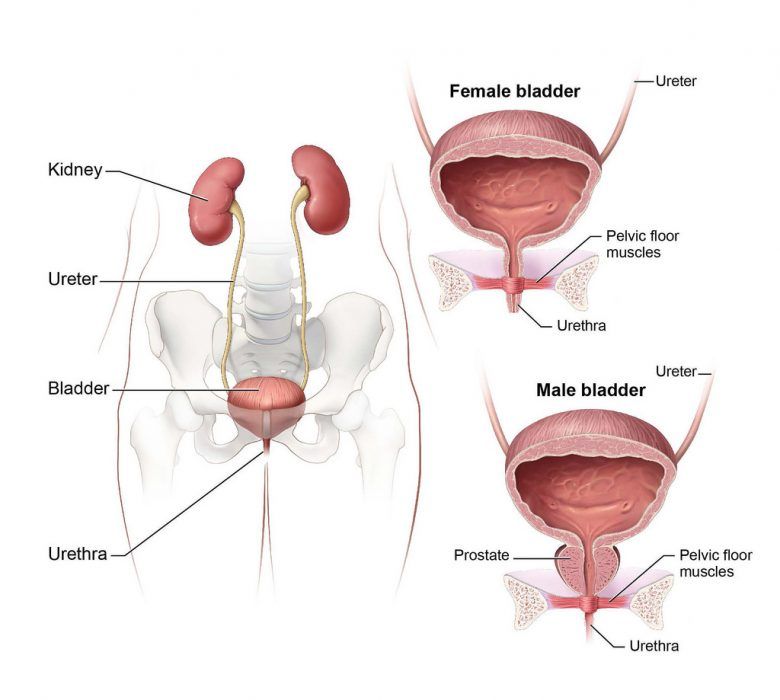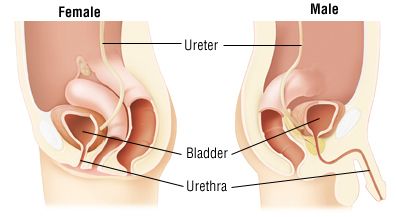Non-gonococcal urethritis, or NGU, is an infection in the urethra, the tube that runs from the bladder to the outside of the body. The term "non-gonococcal" means the infection is not cause by gonorrhea. Urethritis that is caused by gonorrhea is called gonococcal urethritis.
Non-gonococcal urethritis affects millions of people every year. It almost always spreads through sexual contact, so anyone who is sexually active should understand what the infection is, how to recognize the symptoms, and how to seek treatment.

What Is Non-gonococcal Urethritis (NGU)?

Non-Gonoccocal urethritis (NGU) is a medical term used to describe an inflammation in the urethra. The urethra is the passage that carries urine from the bladder outside the body. In most cases, NGU is caused by an infection. The reason for the term non-gonococcal is simply to indicate that the infection is not caused by gonorrhea, a sexually transmitted bacterial infection.
Some medical professionals may also use the term non-specific urethritis for NGU, especially if a there is no obvious cause.
NGU is characterized by inflammation and soreness in the urethra. It's possible to be infected with the bacteria that cause NGU without experiencing symptoms. Fortunately, the infection can be treated with medicine, and it rarely causes complications.

Causes
There are several different causes of NGU. The infection results from germs other than gonorrhea. The following pathogens can all cause NGU:
- Chlamydia trachomatis;
- Adenovirus;
- Ureaplasma urealyticum;
- Haemophilus vaginalis;
- Mycoplasm genitalium;
- Haemophilus vaginalis;
- Herpes simplex virus;
- Trichomonas vaginalis.
Chlamydia is the most common cause of NGU. In some cases, NGU can be caused by a virus. The infection usually spreads by the exchanging of bodily fluids during unprotected sex. It is sometimes impossible to identify the specific germ or bacteria responsible for the infection, though.
How Is It Transmitted?
Most cases of NGU are transmitted sexually. Germs and bacteria that can cause the NGU infection can be spread through oral or physical contact with the genitals. If these germs make their way into the urethra, they can cause inflammation.
In some cases, NGU can develop without sexual contact. It may result from a urinary tract infection, an inflamed prostate gland, a narrowing of the urethra, or catheterization. NGU cannot spread through kissing, hugging, sharing towels, or other non-sexual contact.
NGU affects men far more than it affects women. However, if a pregnant woman has NGU, the infant may be exposed to the germs during birth, which can lead to infections in the eyes, ears, and lungs.
Signs and Symptoms
Although both men and women can develop NGU, their symptoms may differ. Symptoms of non-gonococcal urethritis can develop within a few days after being infected or may not appear for several months, depending on the cause. If the problem is the result of an irritation, symptoms are more likely to show up within a few days.

Symptoms in men – pain or burning with urination and a cloudy or white discharge from the tip of the penis are the most common signs of NGU caused by an infection. In addition the tip of the penis may feel sore and irritated. If NGU is caused by an irritant, the only symptoms may be pain and burning.
Often times, men with NGU don't experience any signs or symptoms. The most common symptoms are irritation of the penis, frequent urination, burning or stinging when urinating, and discharge from the urethra. Some men also experience testicular pain and swollen testes.
Symptoms in women – women may have no symptoms of NGU, especially in the early stages, unless the condition causes a urinary tract infection. In that case, the most likely symptoms are burning, pain and frequency of urination. However, NGU can result in pelvic inflammatory disease (PID) if the infection spreads to the uterus, Fallopian tubes or ovaries. Symptoms of PID include abdominal pain, pain during intercourse, bleeding between periods and after sex, and vaginal discharge, especially if it is yellow or green in color. In severe cases, a high temperature, severe lower abdominal pain, and nausea and vomiting may be present.
In women, the most common symptoms of non-gonococcal urethritis include discharge from the vagina and pain when urinating. In rare cases, women with NGU may experience abdominal pain or abnormal vaginal bleeding, which is a sign that the infection has led to pelvic inflammatory disease.
Both men and women with NGU tend to have worse symptoms in the morning. The symptoms are often so mild that they're not concerning, though. However, if the infection progresses, it can be harmful, so it's important to see a doctor if you experience any of the symptoms to any degree.
Facts and Statistics
- NGU affects about 3 million Americans every year. Worldwide, there are about 89 million reported cases of the infection each year.
- Non-gonococcal urethritis accounts for about 80 percent of all cases of urethritis. The other 20 percent of cases are gonococcal, which means they're caused by gonorrhea.
- NGU incidence tends to increase during the summer months.
- Almost 50 percent of men who have NGU don't experience any noticeable symptoms.
- The most common causes of NGU are chlamydia and Mycoplasma genitalium, a type of bacteria.
- If symptoms do occur, they usually appear two to four weeks after infection.
Tests and Diagnosis
The first step in diagnosing NGU is a visual exam. Your doctor will look for inflammation and other signs of infection. To diagnose NGU, your doctor must rule out gonorrhea, so they may take a urine sample or use a swab to collect a sample from the opening of the urethra.
The diagnosis of urethritis can be made based on a patient’s symptoms, but specific testing is necessary to identify the organism causing the infection. The two tests most commonly used are a urethral swab or a urine test.
Urethral swab – a cotton bud (like a large Q-tip) is used to collect a sample or any drainage from the penis or urethra. The swab is then rubbed on a glass slide and the slide is examined under a microscope. In some cases, special stains are applied to help identify the organisms.
Urine test – also called a urinalysis. The patient is asked not to urinate for about an hour. A urine sample is then collected, using special techniques to prevent contamination. Testing material can be dipped into the urine to identify the presence of white blood cells or bacteria, but the sample must also be evaluated under a microscope to identify the specific bacteria or virus causing the infection.
Culture and sensitivity – either of the above tests also provide material that can be grown on a special culture medium. The resultant colonies of organisms are then exposed to different antibiotics or anti-viral medications to determine which is the best choice for treatment.
Your doctor may be able to look at the sample under a microscope and tell you the results right away. However, you may need to wait a few days to find out whether you have an infection that could cause NGU. Chlamydia is the most common cause of NGU, so your doctor may recommend a chlamydia test.
Different tests have different levels of accuracy. Urine tests are typically more accurate the longer you've gone without urinating. You may have to give multiple samples or take multiple tests to accurately narrow down the cause of the NGU.
You may be able to get a home test for chlamydia and gonorrhea to determine the cause of the infection. If the results for both are negative, though, you must speak to your doctor or go to a sexual health clinic for more tests. Even if your home test confirms the cause of the NGU, you should still consult your doctor for treatment options.
Treatment
Treatment for non-gonococcal urethritis usually involves a course of antibiotics. Depending on the type of antibiotic your doctor prescribes, you may only have to take a single dose, or you may have to take a longer course. Most people need to take antibiotics for about a week, but some forms of NGU require a two-week course of antibiotics. The following are some of the most common medicines used to treat NGU:
- Azithromycin
- Doxycycline
- Erythromycin
- Ofloxacin
Recurring cases of NGU are usually treated with the antibiotic metronidazole. It's important to complete the full course of antibiotics even if you feel better before you've finished them. If your symptoms haven't gone away after the course of antibiotics, you should return to your doctor.
If your doctor determines the cause of your case of NGU, you may need additional treatment to take care of that issue. You should abstain from sex until you've finished all treatments. During a follow-up appointment, you may have to undergo another urine test or swab test to make sure the infection is gone.
Treatment for Partners
NGU typically spreads through sexual contact, so anyone you've had sex with in the past two or three months should be tested and treated. In addition to clearing them of the infection, this will also prevent you from becoming reinfected.
Even if your partners show no signs or symptoms of infection, they should still undergo treatment. Many people with NGU have no symptoms, but they can transmit the infection to others. Because NGU is often caused by chlamydia, there may be a risk that your partner or partners have chlamydia, and they must be informed of that possibility.
Your doctor can give you advice on how to speak to your partners about this matter. If you're uncomfortable speaking to your partner or partners about NGU, your healthcare providers may be able to contact them for you. The conversation will be confidential, and they won't mention your name.
Since NGU is a sexually transmitted infection, it means both partners must be treated. This is particularly important when the infection is first discovered in a man, as women may be infected but have no symptoms. The lack of symptoms means the woman will not be likely to seek treatment. In addition, women are more likely to develop serious complications like PID if the infection is not treated promptly. Doctors who diagnose NGU will ask patients about their sexual partners for just this reason. NGU is considered a reportable condition and must be reported to the local health department for follow-up and treatment of anyone else who might be infected.
Outlook
Most people who receive treatment for NGU see their symptoms clear up very quickly. If you and your partners are promptly and properly treated, it's unlikely that the infection will return. However, when left untreated, NGU can lead to serious health concerns.
Some people experience recurring cases of NGU. This may happen if the antibiotics don't work or if you have sexual contact with an infected and untreated partner. Usually, recurring NGU can be treated with different antibiotics, so you shouldn't be concerned as long as you see your doctor right away.
Complications
Untreated NGU can sometimes lead to long-term, serious complications, especially when it's caused by chlamydia. One of the most common complications is epididymitis, which is pain and swelling in one or both testicles. If this problem goes untreated for a long time, it can lead to fertility problems. Another possible complication is sexually acquired reactive arthritis, or SARA. This can cause inflammation in the joints and eyes, and it can worsen the inflammation in the urethra caused by NGU.
Women who have NGU rarely experience symptoms, but the infection can still cause health consequences. An infection that goes untreated for a long time may lead to pelvic inflammatory disease, which can cause problems with fertility.
Possible complications include the following:
- Pelvic inflammatory disease (PID) – PID can occur with any form of NGU, but is most likely if the infection is caused by chlamydia. The infection can affect a woman’s entire reproductive system and may cause permanent sterility, especially if it is not treated promptly.
- Recurrence – if the patient does not take all the medication or if the medication doesn’t completely eradicate the organisms, NGU may recur. Drug-resistant strains of bacteria may also increase the risk of recurrence. Sometimes a different medication is required.
- Reactive arthritis or Reiter’s syndrome – occasionally an infection will cause the immune system to over-react and begin to attack healthy tissue. This can result in joint pain that is very similar to rheumatoid arthritis.
- Epididymitis or orchitis – these conditions result when the inflammation or infection spreads to the testicles.
- Cervicitis – women can develop an inflammation of the cervix, or mouth, of the womb.
- Chronic urethritis – even after the infection has cleared up, some people can develop chronic inflammation of the urethra. While not dangerous, it can be uncomfortable or even painful.
- Stricture – chronic inflammation can lead to scarring and narrowing of the urethra, which is known as a stricture.
- Dysuria – even after the infection has healed, some individuals will continue to experience difficult or painful urination, which is called dysuria.
- Infertility – if NGU progresses to PID in women or epidymitis/orchitis in men, it may affect or permanently impair fertility.
- Conjunctivitis – if the organisms that caused the NGU are present in the birth canal during labor and delivery, the baby may become infected.
- Skin lesions – NGU caused by chlamydia may result in skin lesions on the hands. These may look like small blisters with a yellow center. Men may also develop a painless skin inflammation of the penis that causes redness and scaly skin.
- Miscarriage – NGU in women may result in spontaneous abortions.
- Chronic pelvic pain – the inflammation from NGU may lead to scarring in reproductive system and result in chronic pelvic pain, particularly in women.
- Pneumonia – infants can be infected by the organisms that cause NGU if the mother becomes infected prior to pregnancy or while pregnant. The child is exposed to the organisms during the passage through the birth canal and may inhale or swallow contaminated fluids. This may result in pneumonia.
Prevention
You can contract NGU, chlamydia, and other STIs from sexual partners even if they show no symptoms. Therefore, it's essential to practice safe sex to prevent health problems. You should use external or internal condoms every time you have sex. Condoms or dental dams should also be used during oral sex.
If you have symptoms of NGU or an STI, you should avoid all sexual contact. You should also avoid sexual contact with anyone who shows symptoms of an STI or has been exposed to an STI. Regular checkups and STI tests can help you get diagnosed early if you do contract an STI or become infected with NGU. This is especially important if you have multiple sexual partners or if your partner has multiple sexual partners.
FAQs
How do I know how long I've had NGU?
Unfortunately, the diagnostic tests can't tell you how long you've had the inflammation or infection. Therefore, it's recommended that you inform all of the sexual partners you've had in the last two or three months about the infection.
Will NGU affect my fertility?
Most people with NGU experience no fertility problems. However, untreated STIs do sometimes cause infertility. Untreated NGU may lead to fertility issues, especially if it's caused by chlamydia. If you seek treatment early, though, you should have no complications.
How soon after sex can I be tested for NGU?
You may be able to get tested for signs of inflammation just a few days after having sex, but it can take up to two weeks for the infection to show up in a urine or swab test.
Can NGU go away without treatment?
It's highly unlikely that NGU will go away on its own. Even if your symptoms clear up, you probably still have the infection, and you can still spread it to others.
How soon can I have sex after starting treatment for NGU?
It's strongly recommended that you avoid sexual contact until you and your partners have completely finished the treatment. This is usually about a week, but it may vary depending on the type of antibiotics your doctor prescribes. Abstaining from sex during treatment prevents you from passing the infection on, and it gives the urethra time to heal from the inflammation.
Should I tell my partner I have NGU?
While no one can force you to share this information, it’s important that your partner be tested and treated. Remember, women can be infected for a long time without showing any symptoms, and the consequences of the infection – such as infertility or sterility – can be serious. It may be helpful to ask your health care provider to help you initiate this conversation between you and your partner. Even though it may be uncomfortable or upsetting, honesty is the best thing for your and your partner’s long-term health.
How do I tell my partner that I have NGU?
It can be uncomfortable and embarrassing to tell your partner about NGU or another STI, but it's necessary. If you choose to speak to your partner face-to-face, you should do so in a safe and comfortable environment. Let them know that you care about them and that you want to make sure they're healthy. Tell them all the facts, and try to avoid being confrontational.
If you don't want to speak to them in-person, you may be able to have a member of your healthcare team make a confidential phone call to them. You can also have your doctor's office arrange a contact slip to give to your partner or partners, which will explain that they may have been exposed to an STI and should schedule a checkup for testing. This slip won't include your name, so the information will remain confidential.
If my partner is diagnosed with NGU, does that mean he or she was unfaithful?
NGU is less likely in monogamous relationships, especially those of long standing. However, the symptoms may not appear for months after the initial infection took place and women may infected for a long time without having symptoms. Your partner could have become infected before your relationship began. It is also possible to become infected with an organism like herpes even in long-standing monogamous relationships.
Can babies get NGU?
If the mother has the infective organisims in her reproductive tract, a baby can be exposed to them during the birth process. The baby is not likely to develop urethritis, but to have an eye infection (conjunctivitis) or lung infection because of contacting the infectious bacteria.
Are men or women more likely to get NGU?
While neither men nor women are more susceptible to NGU from a biological standpoint, men who have multiple sex partners and are between the age of 15 and 30 are the group at highest risk.
Why is the health department contacting me?
NGU is a reportable disease. Because of the potential to infect others, the doctor who makes the diagnosis is required to notify the health department, which will then try to contact all of your former or current sexual partners. These contacts can be kept anonymous; your partner(s) will be notified they may have been exposed by not by whom. However, if your partner has not had sex with anyone but you, it will be pretty easy to identify the source of the infection.




